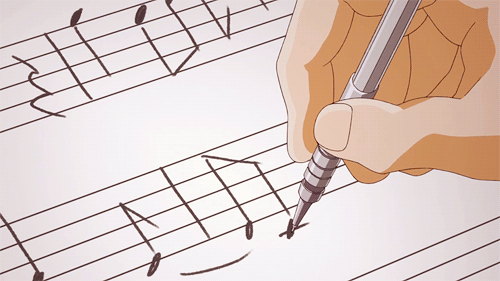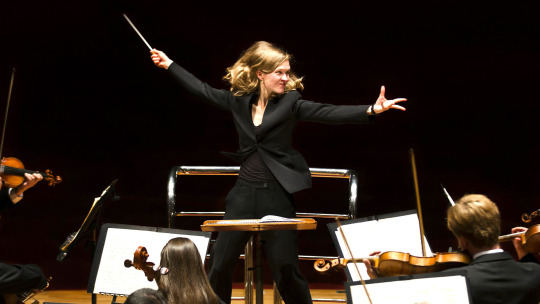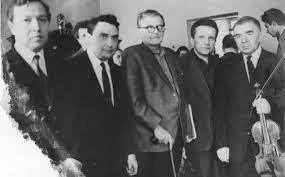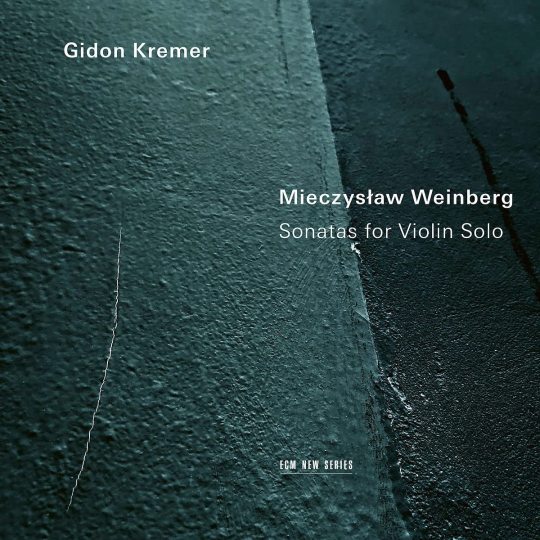#Mieczyslaw Weinberg
Explore tagged Tumblr posts
Text
youtube
Sol Gabetta (cello) and the Orchestre Philharmonique de Radio France, conducted by Mikko Franck, perform the Cello in d minor op.43 composed in 1958 by Mieczyslaw Weinberg (1919 – 1996)
6 notes
·
View notes
Text
I am begging all of you to listen to mieczyslaw weinberg's cello fantasia. specifically the second movement. it's just so
8 notes
·
View notes
Text

Mieczyslaw Weinberg - kennt man diesen Komponisten? Wohl eher nicht, wenn dann wohl eher nur die Spezialisten. Ich als Normalsterblicher muss sagen, dieser Komponist sagte mir wie so oft nichts, aber die beiden Stücke von ihm, zum einen die „Rhapsodie über Moldawische Themen“ op. 47/1 und zum anderen das „Konzert für Violoncello & Orchester“ op. 43, waren der Hammer! Es war WOW! Aber erstmal von vorne. Mieczyslaw Weinberg wurde am 8. Dezember 1919 in Warschau geboren und ist über Minsk und Taschkent nach Moskau gekommen, da er vor den Nazis geflüchtet ist. Unter Stalins Diktatur landete er in einem Gulag, wo er nur deswegen überlebt hat, da Stalin verstarb und er aus dem das Glück hatte entlassen zu werde. Nicht jeder wurde automatisch rehabilitiert. Er konnte weiter als Komponist arbeiten. Dabei half vermutlich auch, dass er von Schostakowitsch gefördert wurde und dieser auch Weinbergs erste Sinfonie abgenickt hatte. Man merkt, es ist wieder ein richtig runder Abend in Aussicht gestellt worden und ja, ich hatte keine Ahnung von Mieczyslaw Weinberg. Man könnte auch sagen, ich war unvoreingenommen. Ich war schon beim ersten Stück des Abends vollkommen hin und weg. Dieser Wechsel zwischen Violine, Flöte und Klarinette waren umwerfend. Dazu sowohl die Wucht und das Sensible im Wechsel waren wirklich so, wie ich mir Moldawien und die Musik dort vorstelle. Dieses Flair und die Landschaften konnte ich teilweise doch raushören oder meinte es zumindest. Und ich konnte verstehen, dass ich danach gehört habe, wie sich auch andere Gäste wunderten, warum man diesen Komponisten nicht kennt. Kommen wir nun zum zweiten Stück von Mieczyslaw Weinberg an diesem Abend mit dem österreichischen Cellisten Christoph Stradner. Sein Violoncello stammt von niemand geringerem als Antonio Stradivari. Wie sagte meine Kollegin Heike: Das Instrument ist nur immer so gut, wie der der es spielt. Was soll ich sagen? Dieser Mann kann es! Als ich mir das angehört habe, was er im Solo spielte und wie schnell er gegriffen hat – ich hätte mir sämtliche Finger und Knochen in der Hand gebrochen. Es klang einfach nur toll! Dann das Zusammenspiel mit dem Philharmonischen Orchester Gießen! Es war einfach nur herrlich! Diese Melancholie in der Musik mit den tiefen Tönen war einfach nur schön anzuhören. Somit war die Pause irgendwie anders als beim 1. Sinfoniekonzert, wo ich doch ein starkes Bauchgrummeln bei den Gästen gehört habe. Hier wurden Programm und Musiker sehr gelobt. Komme ich nun zu Schostakowitsch. Klar sagte er mir etwas. Allerdings ist es ja manchmal so, dass man nicht immer alles gleich gedanklich richtig verknüpfen kann, aber bei den ersten Takten ist alles wieder da und man fühlt sich wohl, so auch diesmal. Aber auch die Geschichte von Schostakowitsch ist sehr interessant und prägt sein Werk. Er war zwar berühmt, aber nicht völlig stumm gegenüber dem Regime. Er hat sich kompositorisch gegen Stalin gestellt und über die 5. Sinfonie in d-Moll wird sogar gesagt, dass das Marschfinale kein Triumphmarsch war, sondern eher ein Todesmarsch. Aber dies wie gesagt, kann man so oder so auslegen und heute gab es ja nicht die 5. Sinfonie, sondern die 1. in f-Moll. Einfach mal die Augen schließen und zuhören, manchmal wollte ich auch nur noch in die Musik eintauchen. Ich habe die immer wieder eingestreuten Soli und Tempowechsel genossen. Es war schön zu sehen, wie die Musiker teilweise abgegangen sind, wie sie die Musik ausgelebt haben. Es war also wie immer – ein wunderbarer Abend! Man sollte einfach dem Sinfoniekonzert im Stadttheater eine Chance geben und hingehen, egal welches Stück, egal ob man den Komponisten kennt, oder nicht. Man kann doch mal einen neuen Komponisten kennenlernen und ja, die Karten sind immer ihr Geld wert. Es würde mich sehr freuen, wenn der Anteil an jüngeren Menschen noch ein wenig in die Höhe steigen würde, denn klassische Musik kann Saiten in einem zum klingen bringen, die Popmusik oder andere Musik nicht annähernd so anschlagen. Also, wie wäre es mal neue Komponisten und klassische Musik kennenzulernen? Das nächste Sinfoniekonzert ist übrigens am 05.11.2019. Kennen sie Pantscho Wladigerow schon? Nein? Ich auch nicht, aber ich werde ihn da kennenlernen. Read the full article
0 notes
Text
Shostakovich researcher here. In terms of his acts of charity towards other artists, there are several documented cases of him using his political ties and artistic prestige to support his contemporaries financially or to save them from persecution. I've already written about how he supported Prokofiev after the Zhdanov decree despite their artistic disagreements, but another fascinating anecdote is his support for the composer Mieczyslaw Weinberg.
Weinberg was a Jewish composer who fled Nazi-occupied Poland to the Soviet Union in the 1940s. (He's also sometimes known as Moishe, Metak, or Moisei Vainberg, but I tend to use his Polish name.) He became friends with Shostakovich, and while it was known for a long time that Shostakovich's style influenced his own, music scholars now believe the influence was mutual, and that there are elements of Weinberg's style in Shostakovich's works.
In the late 40s and early 50s, Stalin carried out a series of anti-Semitic purges due to the so-called "Doctors' Plot," a conspiracy that suggested Jewish doctors and intellectuals were planning to kill many prominent Soviet political officials. Among those killed during the "Doctors' Plot" purges was Solomon Mikhoels, a Yiddish theatre actor and Weinberg's father-in-law. Soon after, Weinberg was also arrested. According to Weinberg's wife, Natalya Vovsi-Mikhoels, Shostakovich wrote a letter to the infamous Lavrenti Beriya pleading Weinberg's release- something she notes was incredibly risky, given Weinberg's Jewish identity during the "Doctor's Plot" purges and the fact that his father-in-law had been assassinated as a result of them, along with Weinberg's status as an "enemy of the people" at the time. Shostakovich and his wife Nina had even made arrangements to adopt their daughter Viktoria if Vovsi-Mikhoels was also arrested. Fortunately, after Stalin's death in 1953, Weinberg was released from prison (although I haven't been able to find whether or not Shostakovich's involvement contributed to this).
In Vovsi-Mikhoels' own words (Source- Elizabeth Wilson's Shostakovich: A Life Remembered):


Anyway, I definitely recommend in-depth music history research for those who have the time and interest! You'll find that despite the popular misconceptions and portrayals of many composers that were out there, many of them lived very fascinating and complex lives- Tchaikovsky, for instance, was a much more multifaceted and nuanced figure than he's commonly perceived.
As for Shostakovich recommendations, my favorite works of his include Piano Trio no. 2, Violin Concerto no. 1, Symphony no. 13, and Quartet no. 9. There's also the Antiformalist Rayok, which I wrote a post about here.
Most heartwarming things about every composer ❤️

┏━•❃°•°❀°•°❃•━┓
Mendelssohn: the profound respect he had for others
The way he’s so cordial with strangers and even the people he dislikes
Man always remembers his manners and acts cordial as his family has taught him
And on occasions, his bursts of excitement to the point of switching languages highlights his joy to see who his loves
From the 1830's when he was in his 20s: “his excitement was increased so fearfully … that when the family was assembled … he began to talk incoherently in English.”
“His attachment to Mademoiselle Lind’s genius as a singer was unbounded, as was his desire for her success.” About Mendelssohn’s attitude to his wife
The amount of passion letters he wrote may be destroyed, but how his wife described him spoke it all: “He was the only person who brought fulfilment to my spirit, and almost as soon as I found him I lost him again.” ๐·°(৹˃̵﹏˂̵৹)°·๐ the feels bro
Recommended piece: Op. 34 No. 2
⊱ ────── {⋅. ♪ .⋅} ────── ⊰
Chopin: his love for family
Despite his disrespect and uncalled for criticism towards other composers, he still cares about his homeland
Even in his deathbed, he asked a soprano to sing the Polish national anthem
And he sent his siblings letters everyday when he was out of town
And through his ‘love’ letters to his friend, Tytus, you can tell he was passionate (;
“You don’t like being kissed. Please allow me to do so today. You have to pay for the dirty dream I had about you last night.” 👀 Chopin to Tytus — his ‘best friend’
We might never know if he actually meant it or if it was social etiquette back then, but the speculation is still there
Recommended pieces: Op. 22
⊱ ────── {⋅. ♪ .⋅} ────── ⊰
Liszt: everything about him
this man truly was an underrated jewel in the classical word
He was generous to the point where he went broke from teaching music free of charge and holding charity concerts all the time
People from his and our time both misunderstand him for being a womaniser, but he was more than that
He never disrespected any female composers and even when he criticised by his contemporaries, he always kept his cool and even complimented some of them
When Chopin criticised him for playing his nocturnes the wrong anr demanded an apology, Liszt still continued to admire him
Composer chivalry fr.
Recommended pieces: Totentanz
⊱ ────── {⋅. ♪ .⋅} ────── ⊰
Tchaikovsky: his devotion and mellow kindness
He was sweet and shy. Unlike Chopin.
Having only a few close friends and a tightly-knit family, he was fiercely loyal and to whom he loved.
As a gay man in the conservative 19th century Russia, he could only seek solace with his closest friends — his sister being the closest.
When his sister passed, all he could was to dedicate the entire Nutcracker Ballet to her as a part of his self-expression died with her.
And she meant a lot to him. Not only a part of himself was buried, the fact he loved her so much despite his depression and dissatisfaction towards his life, showed how close he was to his family.
Recommended piece: Pas de Deux (it showed his lonely yearning for love in my interpretation; those whimsical melodies and how he missed both sisterly and romantic love)
⊱ ────── {⋅. ♪ .⋅} ────── ⊰
Beethoven: man pulled 2015 pranks in the 19th century
Even though he scowled and raged throughout his life, he pulled pranks and laughed when his guests fell for it
He hid behind the door and scared his guests whenever they went through it
Laughing at their annoyed faces, he continued to turn annoyance to offence when he made his friends the butt of his jokes
To further gouge tears from his grumpy little face, he made more short songs solely as jokes about them
Besides being a hopeless romantic who made Fur Elise as a way to diss Elise, he wrote lyrics, “we all agree that you are the biggest ass” when joking about his violinist friend
Beethoven was either a great or absolutely horrible friend to have
⊱ ────── {⋅. ♪ .⋅} ────── ⊰
Shostakovich: a genuinely good guy
Every lonely person’s wet dream
Showing up on time, being nice back to everyone who was nice to him alongside living life the normal way despite being a composer, he never raised any aggression tendencies like other composers (take notes Beethoven :/)
Love extended beyond family and friends. He threaded and worded his letters with kindness and manners, especially to those who asked him for advice
Even under his intense stress and anxiety during the Soviet Union’s surveillance, the man loved his family.
And that in itself was impressive.
┗━•❃°•°❀°•°❃•━┛
Author’s note: I may not have written a recommended piece for all of them because I am not well-versed in most of their pieces yet
Do tell me what composers to do. I am happy to write about them <:
Much feedback is appreciated ଘ(੭*ˊᵕˋ)੭* ੈ♡‧₊˚
631 notes
·
View notes
Link
0 notes
Photo

Galina Vishnevskaya, David Oistrakh, Mstislav Rostropovich, and Mieczyslaw Weinberg during a home rehearsal before the first performance of Shostakovich’s Seven Romances on Poems of Alexander Blok. Photographed by V. Akhlomov on June 21, 1967.
#Galina Vishnevskaya#David Oistrakh#Mstislav Rostropovich#Mieczyslaw Weinberg#Music#Dmitri Shostakovich#Favorite
218 notes
·
View notes
Text
La hora de Weinberg

[Mirga Gražinytė-Tyla (Vilnius, 1986) / DANIELA SCHMIDT-LANGELS]
La directora lituana Mirga Gražinytė-Tyla continúa en Deutsche Grammophon su apuesta por el compositor polaco Mieczysław Weinberg
En 2016 Mirga Gražinytė-Tyla (Vilnius, 1986) fue nombrada directora titular de la Orquesta Sinfónica de la Ciudad de Birmingham y tres años después, la joven maestra debutó en Deutsche Grammophon con un álbum que incluía dos obras del compositor Mieczysław Weinberg (1919-1996), de quien aquel año se cumplía el centenario de su nacimiento. Gražinytė-Tyla ha vuelto sobre el músico, pues DG acaba de publicar el viernes pasado su último registro con otras tres obras de Weinberg. Si en 2019 fueron la Sinfonía nº2, escrita para orquesta de cámara en 1946, y la Sinfonía nº21, una obra completada en 1991 como memorial a las víctimas del Gueto de Varsovia y titulada Kaddish, ahora son las Sinfonías nos. 3 (1949/1960) y 7 (1964) y el Concierto para flauta nº1 (1961) las obras que han visto la luz.

En el primer álbum la directora lituana colaboró con su compatriota Gidon Kremer, uno de los grandes defensores y difusores de la música de Weinberg. El violinista lituano hacía entonces los solos de la Sinfonía nº21 y prestaba su propio conjunto, la Kremerata Báltica, para la camerística Sinfonía nº2. En esta nueva entrega es la Deutsche Kammperphilharmonie de Bremen la que se encarga de la Sinfonía nº7, una obra escrita para orquesta de cuerda con la singularidad de incluir en la instrumentación un clave solista, que aquí toca el pianista ruso-americano Kirill Gerstein. Para la Sinfonía nº3 y para el Concierto, Gražinytė-Tyla dirige a su conjunto de Birmingham, con la flautista Marie-Christine Zupancic como solista.
La música de Weinberg ha emergido de las sombras en el último cuarto de siglo y, aunque aún no demasiado popular, se trata ya de un compositor muy bien representado en la discografía internacional, no tanto en los ciclos de conciertos (al menos, en España). Nacido en Varsovia en una familia judía de músicos originaria de Moldavia, Weinberg se mostró desde joven como un talento natural para la música y un gran virtuoso del piano. En 1939, a punto de conseguir una beca para ir a estudiar a Filadelfia, la invasión nazi de Polonia lo obligó a huir al este. Estuvo en Minsk hasta que el estallido de la guerra entre Alemania y la URSS lo llevó hasta Tashkent, en Uzbekistán, de donde Shostakóvich, que había quedado impresionado al conocer sus primeras obras, lo atrajo hasta Moscú, en donde residiría el resto de su vida.

[Shostakóvich en el centro de la imagen con Weinberg a su izquierda. / INTERNATIONAL MIECZYSŁAW WEINBERG SOCIETY]
La estrecha relación de amistad con Shostakóvich marcó desde entonces, en buena medida, la existencia de Weinberg, que siempre reconoció en su mayor a un auténtico maestro, aunque en realidad jamás tomara una clase de él. La veneración era mutua, pero el hecho de que el polaco fuera trece años menor pudo influir en el juicio de algunos análisis apresurados que veían en su obra una mera imitación de modelos shostakovichianos. Estudios más serios han encontrado que las influencias fluyeron en ambos sentidos. En cualquier caso, el principal problema para la circulación y el reconocimiento temprano de la música de Weinberg tuvo que ver con circunstancias políticas. Un polaco judío que ni siquiera estaba afiliado al Partido mal podía representar el espíritu soviético, así que fue generalmente maltratado por el régimen, a pesar de lo cual el compositor dejó una obra ingente: 154 piezas numeradas y varios cientos más fuera del catálogo oficial en todos los géneros imaginables. También compuso música teatral (7 óperas, una opereta, dos ballets), pero destacó muy especialmente en el terreno sinfónico (22 sinfonías, seis de ellas con coro, 4 sinfonías de cámara, 2 sinfonietas, 10 conciertos) y en el camerístico, en el que sobresalen, además de varias decenas de sonatas, tríos y quintetos, su soberbia colección de 17 cuartetos de cuerda que puede figurar sin deshonra al lado de los 15 de Shostakóvich como una de las máximas expresiones del género en todo el siglo XX.
No fue hasta 1994 (cuando al músico le quedaban aún dos años de vida) que el sello Olympia, otrora gran seña de identidad de la ya extinta URSS, empezara a dedicarle a Weinberg una serie que ocupó 17 cedés y sin duda ayudó a que su música fuera mejor conocida en Occidente. Desde entonces la labor de algunos intérpretes y sellos (Gidon Kremer en ECM; el Cuarteto Daniel en CPO; Gabriel Chmura en Chandos) sirvió para extender el gusto por una música muy particular, de altísima inspiración melódica y en la que abundan los contraluces, con tiempos lentos a menudo sombríos y melancólicos alternando con otros rápidos en los que a veces aparecen giros folclóricos, en muchos casos derivados de la tradición klezmer.
Enemigo de la raza, enemigo del pueblo
La peripecia vital de Weinberg puede usarse como modelo para profundizar en las peores tendencias totalitarias del siglo XX. En 1939 tuvo que huir de Varsovia, donde quedaron sus padres y su hermana, finalmente deportados del gueto al campo de trabajo de Trawniki donde fueron asesinados en 1943. Llegado a Bielorrusia, en 1941, con la invasión nazi, volvió a huir, esta vez a Uzbekistán, en el Asia central. Allí conoció a un famoso dramaturgo y actor judío Solomon Mikhoels, y se casó con su hija. En 1948, Mikhoels fue asesinado en Minsk por agentes del servicio secreto soviético, quienes al parecer pasaron un camión por encima del cadáver para simular un accidente. Desde ese momento, Weinberg fue siempre sospechoso para el stalinismo, y de hecho su 3ª sinfonía, escrita en 1949, tuvo que esperar hasta 1960 para su estreno. En 1953, el compositor fue detenido, acusado de una inverosímil conspiración sionista que tenía como objetivo establecer una república judía en Crimea. Aunque Shostakóvich intercedió por él (incluso ante el siniestro Lavrenti Beria, el temido jefe del NKVD), Weinberg se enfrentaba a una dura condena, pero tuvo la suerte de que el 5 de marzo muriera Stalin y el músico acabó siendo excarcelado a finales de abril. Pese a ello no dejó de figurar en la ominosa lista de los enemigos del pueblo, de la que sólo salió muy al final de su vida. En 1990, con la perestroika, recibió incluso el Premio Estatal de la URSS.
[Diario de Sevilla. 19-09-2022]
EL CD EN SPOTIFY
#mirga grazynite-tila#mieczyslaw weinberg#orquesta sinfónica de la ciudad de birmingham#deutsche kammerphilharmonie bremen#dmitri shostakóvich#solomon mikhoels#gidon kremer#cuarteto daniel#gabriel chmura#deutsche grammophon#kirill gerstein#marie-christine zupancic#kremerata baltica#música#music#Spotify
0 notes
Text
Gidon Kremer Plays the Complete Solo Violin Sonatas by Mieczyslaw Weinberg on ECM
Gidon Kremer Plays the Complete Solo Violin Sonatas by Mieczyslaw Weinberg on ECM
ECM NEW SERIES 2705 485 6943 Here are the reasons you will want to add this disc to your collection: it is a Gidon Kremer disc, it is an ECM release, it is a major contribution to the recorded legacy of Mieczyslaw Weinberg (1919-1986). Kremer is one of the finest violinists working today. In addition to being a brilliant musician Kremer is an ambassador of new music and an excellent curator. Any…

View On WordPress
#Bach#Bartok#ECM#Gidon kremer#Latvian#Manfred Eicher#Mieczyslaw Weinberg#Polish/Russian Composers#Russian Music#Ysaye
0 notes
Audio
Obras de cámara de Mieczyslaw Weinberg por el Attacca Quartet.
Más detalles en AllMusic.
3 notes
·
View notes
Text
youtube
Mieczyslaw Weinberg (1919-1996) - Trumpet Concerto in B-Flat Major, Op. 94: I. Etudes
Artist: Jurgen Ellensohn
Conductor: Gerard Korsten
Orchestra: Vorarlberg Symphony Orchestra
2 notes
·
View notes
Text
Gidon Kremer at McCarter
Gidon Kremer at McCarter
Gidon Kremer and Kremerata Baltica McCarter Theatre Center Friday, February 3, 2017 By Christian Carey PRINCETON – I’ve wanted to hear violinist Gidon Kremer perform Estonian composer Arvo Pärt’s iconic work Fratres live since I was a teenager. Back then, Kremer’s rendition of the work on an ECM Records New Series CD was transfixing and game changing: it became an almost totemic art object for…
View On WordPress
#Arvo Part#CD Review#CDs#concert review#Deutsche Grammophon#ECM Records#Mieczyslaw Weinberg#philip glass#Reviews#Valentin Silvestrov
1 note
·
View note
Text
Classical Music News of the Week, September 11, 2021

New Century Opens Season with Turnage U.S. Premiere
New Century Chamber Orchestra opens its 2021-2022 season, September 30 through October 3, with four Bay Area performances of “New Century Returns.” The program is highlighted by the U.S. premiere of Lament for solo violin and string orchestra by British composer Mark-Anthony Turnage featuring Music Director Daniel Hope as soloist. Hope also appears as soloist in a rare performance of Concertino for Violin and Strings by Polish composer Mieczyslaw Weinberg and leads the orchestra in Josef Suk’s popular Serenade for Strings, one of the composer’s most celebrated and well-known works.
To read the complete Classical Music News of the Week, click here:
https://classicalcandor.blogspot.com/2021/09/classical-music-news-of-week-september_10.html
John J. Puccio, Classical Candor
0 notes
Photo

Galina Vishnevskaya, David Oistrakh, Mstislav Rostropovich and Mieczyslaw Weinberg during a home rehearsal before the first performance of Seven Romances on Poems of Alexander Blok. From DSCH Journal, Jan. 2018, issue 48.
#shosty homies be tired#shosty#galina vishnevskaya#oistrakh#david oistrakh#slava#mstislav rostropovich#rostropovich#mieczyslav Weinberg#Shostakovich
26 notes
·
View notes
Video
youtube
Weinberg - Symphony No. 21 "Kaddish" (WarsawPhilh Orchestra, Kaspszyk, Molendowska)
0 notes
Photo

If you follow my account closely, you surely have already noticed that I am a huge fan of Dmitri Shostakovich and a keen collector of recordings of his music. This new box Shostakovich plays Shostakovich puts together the complete (?) recordings of the composer himself that can be found in the Melodiya archives. (The famous EMI/Warner recordings are not included). It contains studio and live recordings from the 1940s to the late 1960s, some of them where made in Shostakovich's apartment in Moscow. He performs with his son Maxim, his composer friend Mieczyslaw Weinberg and the who is who of the soviet music: David Oistrakh, Daniil Shafran, the Beethoven Quartet, Alexander Gauk etc. The remastering is excellent. A wonderful addition to every Shostakovich collection. #Classical #Shostakovich #Melodiya #5CD #BoxedSet #ClassiChameleon https://ift.tt/33bLbyX
0 notes
